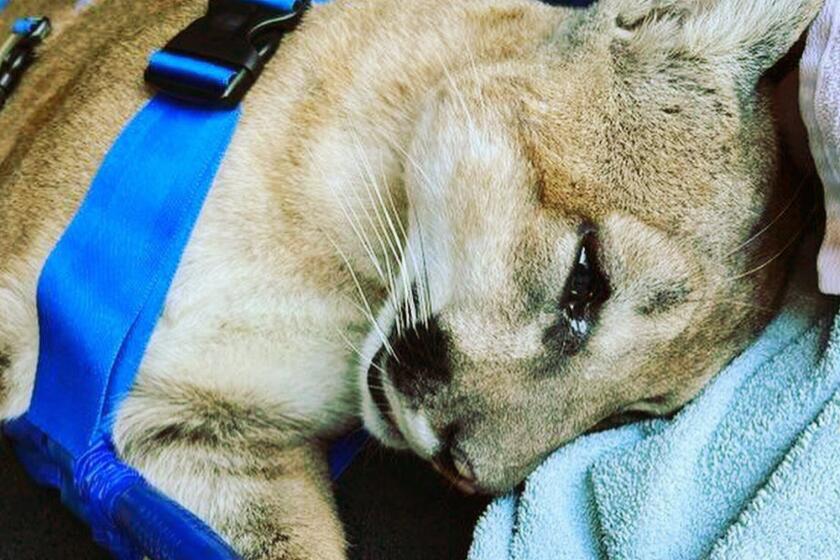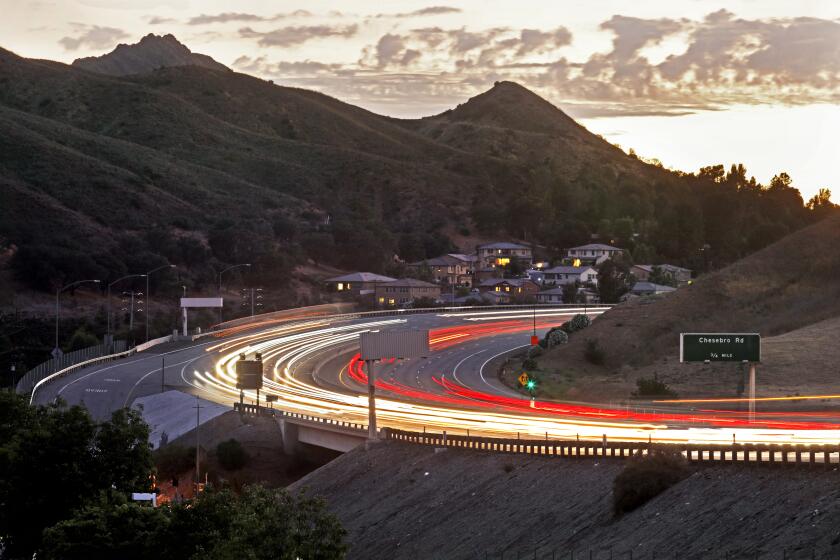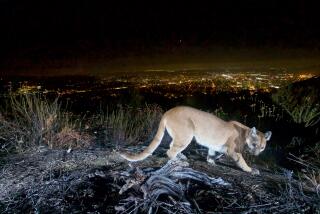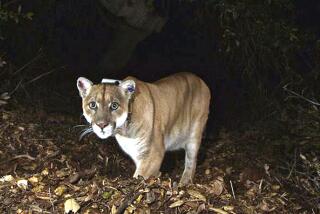Collared mountain lion killed by car on PCH, first death of big cat on coastal highway
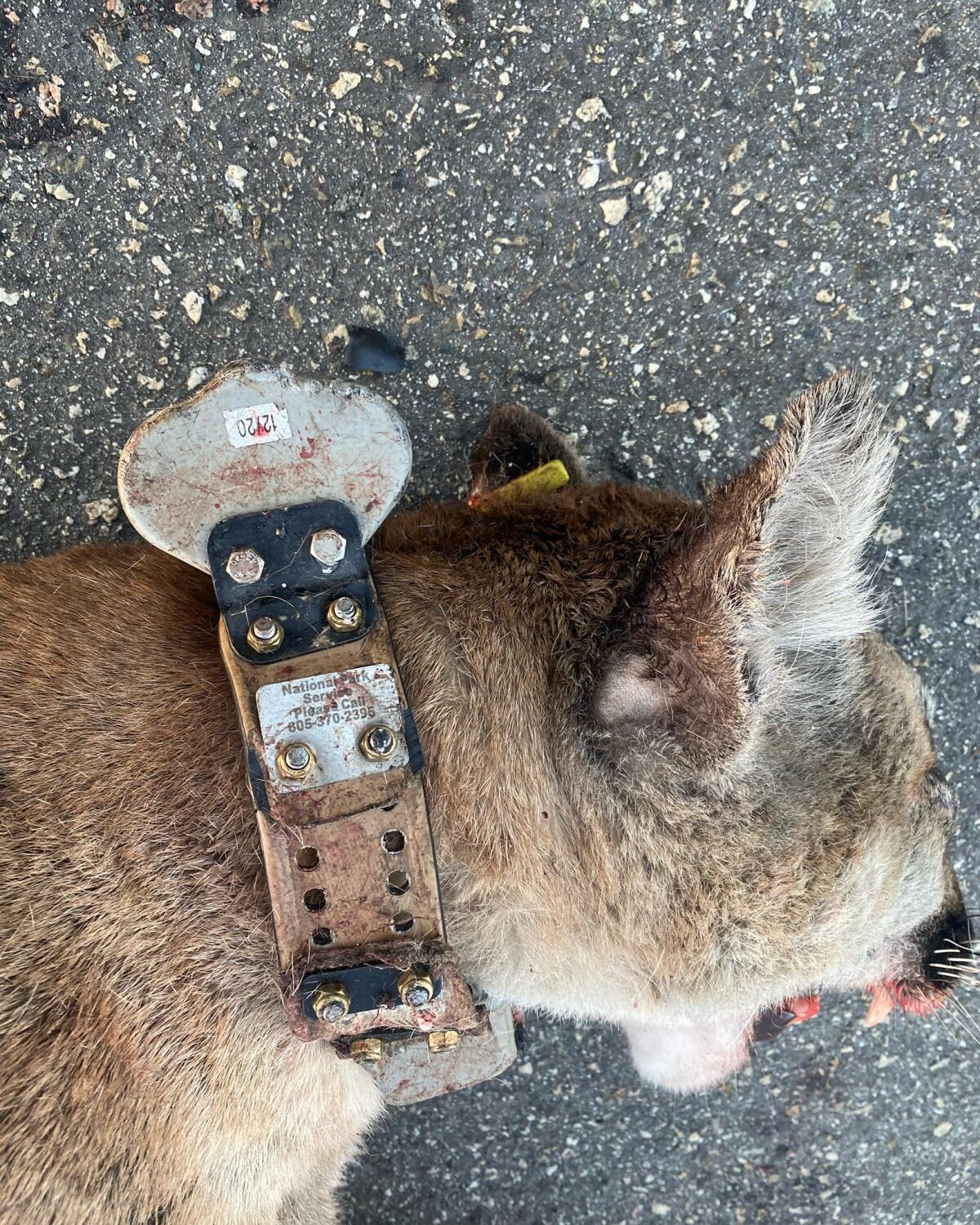
- Share via
Coby Bishop, a law enforcement ranger with the National Park Service, was cruising along Pacific Coast Highway early Wednesday morning when he spotted the carcass of a mountain lion on the roadway.
The young male lion had been struck by a car around 7 a.m. in western Malibu.
Upon further examination, the cougar turned out to be P-104, who was collared just two weeks ago for a study. His death marks the first documented case on the coastal highway, according to the Santa Monica Mountains Recreation Area, a part of the National Park Service.
“It’s always a bummer when we lose a beautiful animal like this,” said Ana Beatriz Cholo, a spokesperson for the recreation area. “We were just about to start learning more about it.
“It just further confirms that road mortalities are a leading cause of death for mountain lions,” she added.
The 113-pound lion was tranquilized before it was ultimately returned to the wild, deep in Orange County’s canyon country.
Biologists said the young lion had crossed PCH several times in the last few days, already singling him out as an unusual cat.
“Although it has occurred before, it is relatively rare that collared mountain lions have crossed PCH,” representatives for the recreation area said in a statement posted to social media.
The young lion was captured and fitted two weeks ago with a GPS radio collar in the western portion of the Santa Monica Mountains. He was the most recent addition to a 20-year study on the large predators living in and around the mountain range, according to the parks’ statement. He weighed 103 pounds when he was captured on March 8.
P-104 is the 25th mountain lion — and eighth collared specimen — to be killed by a vehicle since the study began in 2002.
It’s believed the driver who struck the animal was heading north, and it doesn’t appear the person stopped, Cholo said. The lion was discovered near the 33100 block of Pacific Coast Highway, across from a residential driveway.
The lion was hit hard — and it appears to have done some damage to the car. When Bishop found the carcass, he said car parts were still littered on the highway.
“He suffered very severe and traumatic injuries,” Cholo said of the lion. “Hopefully he died very quickly.”
Architect Robert Rock is designing a bridge over the 101 Freeway in Agoura Hills that will stop mountain lions from becoming roadkill.
It’s not clear why the animal was near the highway, an atypical stamping grounds for mountain lions. But Cholo said there is plenty of shrubbery nearby, near Trancas Canyon, where the lion could hide and hang out.
J.P. Rose, a senior attorney with the Center for Biological Diversity, called P-104’s death “another tragic reminder that our roads are death traps for local mountain lions and other wildlife.”
In a few months, ground is set to break on a wildlife bridge over the 101 Freeway in Agoura Hills, which Cholo said will offer relief for cougars and other critters — by giving them access to wider open spaces and, perhaps, respite from racing cars.
Rose agreed.
“Wildlife crossings have to be a top priority before it’s too late and we lose the Santa Monica Mountains puma population forever,” the attorney said in an email.
P-104’s body is being sent to a lab in San Bernardino, where it will undergo a necropsy.
It will be checked for things such as the presence of rat poisons, Cholo said, a common cause of death among mountain lions. The findings can provide useful information for wildlife officials, she said.
Thirteen mountain lions are being tracked in the region. The study was undertaken “to determine how they survive in a fragmented and urbanized environment,” the recreation area said.
California’s pumas are provisionally protected under the state Endangered Species Act, the center said.
More to Read
Sign up for Essential California
The most important California stories and recommendations in your inbox every morning.
You may occasionally receive promotional content from the Los Angeles Times.

